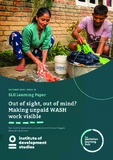| dc.contributor.author | Cavill, Sue | |
| dc.contributor.author | Huggett, Chelsea | |
| dc.coverage.spatial | Global | en |
| dc.date.accessioned | 2023-10-12T08:21:57Z | |
| dc.date.available | 2023-10-12T08:21:57Z | |
| dc.date.issued | 2023-10 | |
| dc.identifier.citation | Cavill, S. and Huggett, C. (2023) ‘Out of Sight, Out of Mind? Making Unpaid WASH Work Visible’, SLH Learning Paper 18, The Sanitation Learning Hub, Brighton: IDS, DOI: 10.19088/ SLH.2023.017 | en |
| dc.identifier.isbn | 978-1-80470-151-5 | |
| dc.identifier.uri | https://opendocs.ids.ac.uk/opendocs/handle/20.500.12413/18124 | |
| dc.description.abstract | Target 5.4 of the UN Sustainable Development Goals (SDG) involves the recognition and valuing of unpaid care and domestic work (UCDW). Much UCDW is related to water, sanitation and hygiene (WASH), and daily workloads increase when household and community WASH services are weak, in disrepair or non-existent (WaterAid 2022). Unequal gender power relations mean women often do the UCDW that other family members are unwilling to do. This makes WASH efforts an obvious lever for change on UCDW by influencing how policy makers make decisions about responsibility for this work. Yet to date the sector has taken little action to change what happens on WASH in people’s homes, leaving gender norms unchallenged or in some cases reinforcing the belief that UCDW is a role for women and girls. This paper adapts the 5Rs framework for decent work (ILO 2018) to explore the kinds of positive changes (recognize, reduce, renumerate, redistribute and relate (with the authors adaption of the latter substituting for representation) that are needed to redress the UCDW balance more fairly between men and women. It outlines the ways in which WASH activities are interlinked with women’s UCDW dimensions and it argues that WASH actors and their services and systems must be actively engaged across the whole of this framework in order to fully address UCDW. Actionable recommendations are given to both fulfil our commitments to reach the SDG targets so that women and girls benefit equally from WASH policy and programmes, and to gather the data needed to ensure that our efforts are working. | en |
| dc.description.sponsorship | Sida | en |
| dc.language.iso | en | en |
| dc.publisher | Sanitation Learning Hub | en |
| dc.relation.ispartofseries | SLH Learning Paper;18 | |
| dc.rights | Attribution-NonCommercial 2.0 UK: England & Wales | en |
| dc.rights.uri | http://creativecommons.org/licenses/by/4.0/ | en |
| dc.subject | Gender | en |
| dc.subject | Health | en |
| dc.subject | Poverty | en |
| dc.subject | Rights | en |
| dc.subject | Water | en |
| dc.title | Out of Sight, Out of Mind? Making Unpaid WASH Work Visible | en |
| dc.type | Series paper (non-IDS) | en |
| dc.rights.holder | Sanitation Learning Hub/IDS | en |
| dc.identifier.externaluri | https://sanitationlearninghub.org/resource/out-of-sight-out-of-mind-making-unpaid-wash-work-visible/ | en |
| dc.identifier.team | Participation Power and Social Change | en |
| dc.identifier.doi | 10.19088/ SLH.2023.017 | |
| dcterms.dateAccepted | 2023-10 | |
| rioxxterms.funder | Default funder | en |
| rioxxterms.identifier.project | The Sanitation Learning Hub | en |
| rioxxterms.version | VoR | en |
| rioxxterms.versionofrecord | 10.19088/ SLH.2023.017 | en |
| rioxxterms.funder.project | 44cbea9c-3179-456c-bc3f-9b7cd4f89d0d | en |


